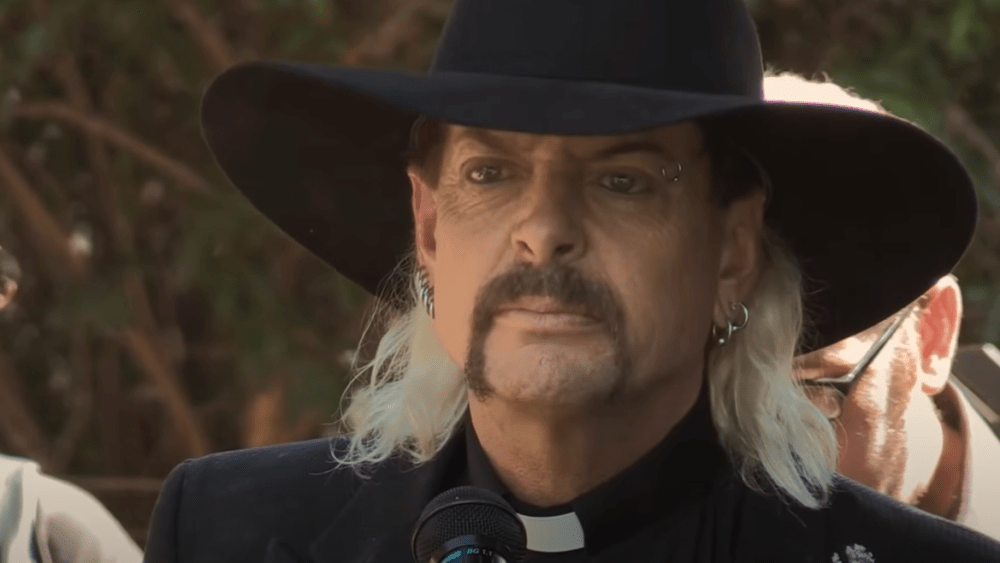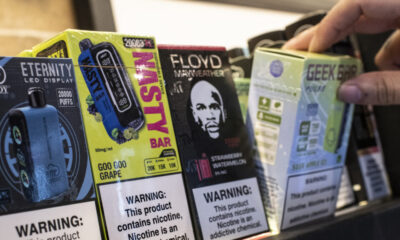Entertainment
‘Tiger King’ ruling could limit use of video clips in documentaries

Filmmakers are warning that a recent ruling in a copyright case against Netflix over the “Tiger King” docuseries could restrict the use of video clips in documentaries and upend a long-standing understanding of what constitutes “fair use.”
The 10th Circuit Court of Appeals, located in Denver, ruled in March that the use of a 66-second clip from a funeral video was not “transformative” under the Copyright Act. The three-judge panel sent the case back to a lower court to determine whether Netflix had violated the copyright of Tim Sepi, the videographer who shot the scene.
Netflix has asked the court to reconsider its decision, and has been joined by the Motion Picture Association, the International Documentary Association, Film Independent and a host of media law professors in raising the alarm about the potential chilling effect on non-narrative storytelling. -fiction stories.
“It’s a big deal,” said attorney Chris Perez, co-author of “Clearance & Copyright,” a film industry guide to rights clearance issues. “It disrupts the common practice that documentary makers have used in recent decades.”
Documentaries often pay to license archive material. But sometimes the copyright holder cannot be found, refuses to grant a license, or charges too high a price. In those cases, filmmakers can rely on the fair use exception under the Copyright Act, which allows the use of copyrighted material under certain conditions, especially if the use is “transformative.”
True crime documentaries – which have exploded in the past decade – often rely heavily on old news clips or unlicensed online video.
In the “Tiger King” case, the filmmakers used a clip of zookeeper Joe Exotic giving an off-color eulogy to his husband while dressed in a clerical collar. The original 24-minute video was streamed live and posted to Exotic’s YouTube page.
‘Tiger King’ was released in March 2020 and became an instant hit in the pandemic era.
Sepi, who had worked as a videographer for Exotic, sued Netflix in September 2020 in Oklahoma federal court, alleging that the filmmakers shot a clip of the funeral, along with seven other clips, without his approval and without any credit .
The district judge dismissed the case, ruling that the seven other clips were recorded while he was working for Exotic, and were therefore considered “employee work.”
The judge ruled that the funeral clip – recorded after Sepi resigned – was ‘fair use’, because the filmmakers had added their own perspective to Sepi’s raw material and thus turned it into something new.
The 10th Circuit overturned that part of the ruling, ruling that the filmmakers did not comment on Sepi’s footage. Instead, they used Sepi’s footage to comment on Exotic, which the panel felt was not sufficiently “transformative” to the original work.
“In other words, the alleged commentary did not ‘comment’ on the original composition, but rather focused on a character within the composition,” Judge Jerome Holmes wrote on behalf of the panel. “Defendants simply wanted to use Mr. Sepi’s funeral video to convey a new meaning or message – namely to comment on and criticize Mr. Exotic.”
In reaching that conclusion, the panel relied on that of the Supreme Court decision in last year’s Andy Warhol case. In that case, the court limited the scope of the fair use defense, ruling that the artist’s rendition of a magazine photo of Prince was not sufficiently transformative.
The Motion Picture Association, which represents the major studios, filed an amicus brief last week in support of Netflix’s request for rehearing, arguing that the court misapplied the Warhol case.
“The Panel’s baseless and erroneous rule jeopardizes creators’ ability to create works based on or commenting on real-world people, places and events,” the MPA’s attorneys argued. “There is a rich tradition of such works using individual parts of earlier works as historical reference points or to illustrate underlying events.”
The International Documentary Association has filed its own amicus brief, along with other groups representing independent filmmakers. They argued that the ruling will have “a huge chilling effect on documentary filmmaking.”
“It will require documentary filmmakers to seek and seek licensing deals from people who cannot be identified or who have no interest in licensing their works,” they argued. “It will incur huge transaction costs that will make documentary filmmaking unaffordable. It will give copyright holders unprecedented control over discussions of history and culture, turning copyright into a form of private censorship.”
In its ruling, the 10th Circuit also highlighted the “commercial” nature of Netflix’s use of the clip, noting that “Tiger King” was streamed by 34 million viewers in the first ten days of release. usage.
Sepi’s lawyer, Andrew Grimm, also emphasized Netflix’s commercial power, saying the streamer had taken advantage of his client. He noted that Sepi was paid only $150 a week, plus accommodation in a trailer, while he worked at Exotic’s private zoo.
“It is not fair for one of the world’s largest media companies to use an aspiring creator’s images without compensation, without credit, without his consent and then use them in the most commercial manner possible,” Grimm argued in his appeal letter.
However, Perez argued that almost all documentaries – from the smallest independent films to Netflix behemoths – are made with some hope of commercial payoff.
Since Warhol’s decision, Perez says his advice to filmmakers about fair use has become a little more conservative. He said he advises against pulling footage from another documentary because it is too similar to its intended use. And he said he warns to be careful when using photos.
But he said the “Tiger King” decision — if it stands — would go much further in limiting filmmakers’ choices.
“It creates a tremendous amount of confusion,” he says. “We really hope this changes.”













